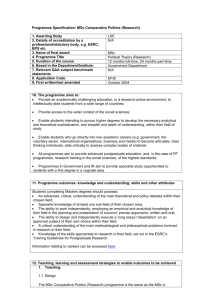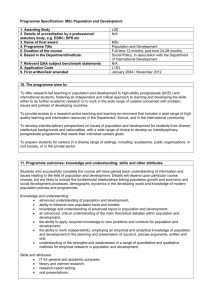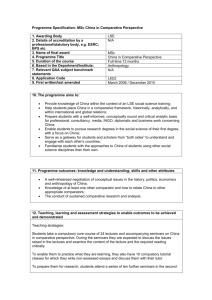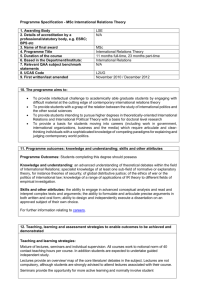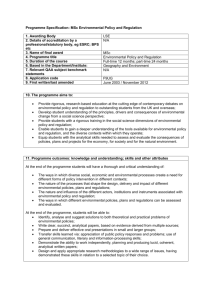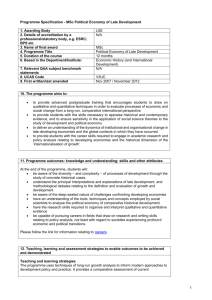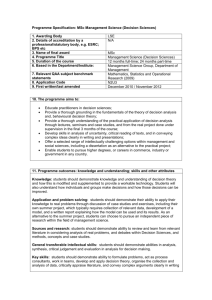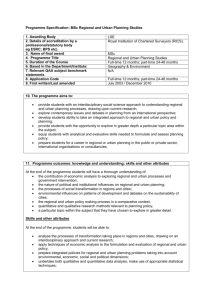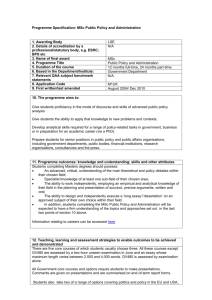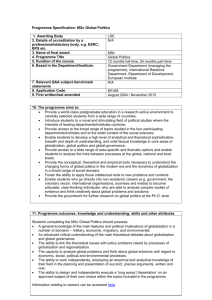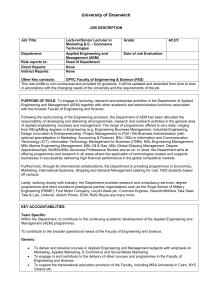MSc Comparative Politics
advertisement
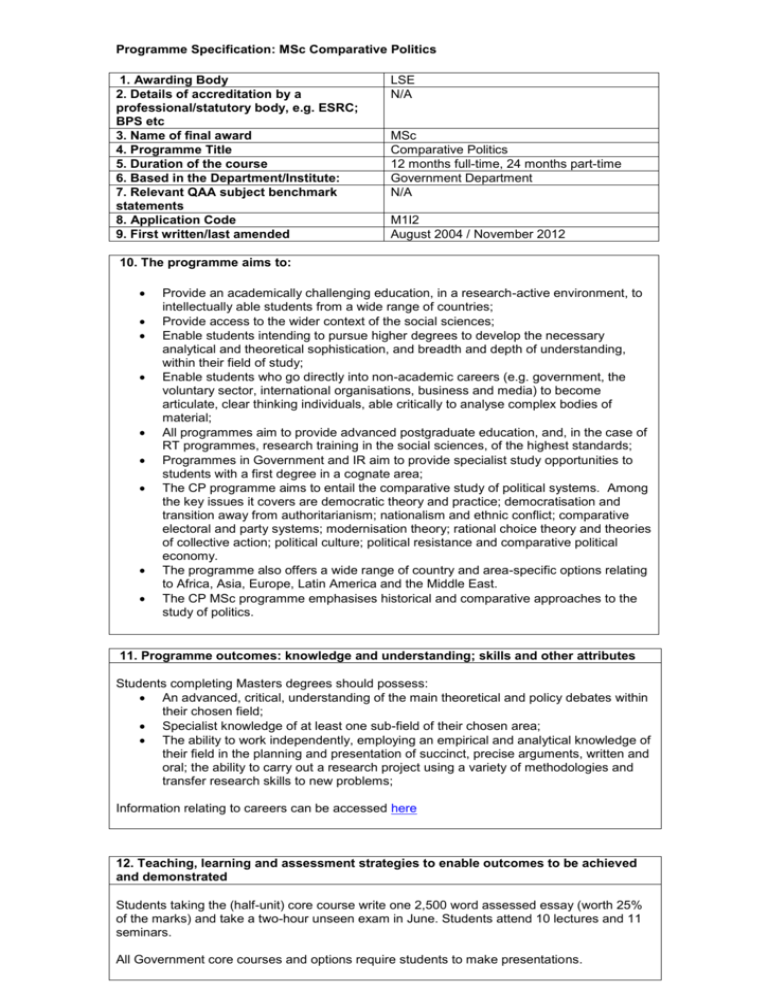
Programme Specification: MSc Comparative Politics 1. Awarding Body 2. Details of accreditation by a professional/statutory body, e.g. ESRC; BPS etc 3. Name of final award 4. Programme Title 5. Duration of the course 6. Based in the Department/Institute: 7. Relevant QAA subject benchmark statements 8. Application Code 9. First written/last amended LSE N/A MSc Comparative Politics 12 months full-time, 24 months part-time Government Department N/A M1I2 August 2004 / November 2012 10. The programme aims to: Provide an academically challenging education, in a research-active environment, to intellectually able students from a wide range of countries; Provide access to the wider context of the social sciences; Enable students intending to pursue higher degrees to develop the necessary analytical and theoretical sophistication, and breadth and depth of understanding, within their field of study; Enable students who go directly into non-academic careers (e.g. government, the voluntary sector, international organisations, business and media) to become articulate, clear thinking individuals, able critically to analyse complex bodies of material; All programmes aim to provide advanced postgraduate education, and, in the case of RT programmes, research training in the social sciences, of the highest standards; Programmes in Government and IR aim to provide specialist study opportunities to students with a first degree in a cognate area; The CP programme aims to entail the comparative study of political systems. Among the key issues it covers are democratic theory and practice; democratisation and transition away from authoritarianism; nationalism and ethnic conflict; comparative electoral and party systems; modernisation theory; rational choice theory and theories of collective action; political culture; political resistance and comparative political economy. The programme also offers a wide range of country and area-specific options relating to Africa, Asia, Europe, Latin America and the Middle East. The CP MSc programme emphasises historical and comparative approaches to the study of politics. 11. Programme outcomes: knowledge and understanding; skills and other attributes Students completing Masters degrees should possess: An advanced, critical, understanding of the main theoretical and policy debates within their chosen field; Specialist knowledge of at least one sub-field of their chosen area; The ability to work independently, employing an empirical and analytical knowledge of their field in the planning and presentation of succinct, precise arguments, written and oral; the ability to carry out a research project using a variety of methodologies and transfer research skills to new problems; Information relating to careers can be accessed here 12. Teaching, learning and assessment strategies to enable outcomes to be achieved and demonstrated Students taking the (half-unit) core course write one 2,500 word assessed essay (worth 25% of the marks) and take a two-hour unseen exam in June. Students attend 10 lectures and 11 seminars. All Government core courses and options require students to make presentations. Comments on presentations are offered to students and recorded on end-of-term report forms. Students take a half-unit skills course (qualitative plus quantitative methods) and choose from a wide range of Government Department options. Options outside the department can be taken with the permission of the Comparative Politics MSc convenor and the teacher of the option. All students write a 10,000 word dissertation designed to test their ability to do a high-quality piece of independent research and analysis over the summer. All students have personal tutors whose main role is: to guide students' choice of suitable options: to help where requested with advice on essays for the core course; to act as advisor and watchdog on the student's overall academic performance, as well as first port of call when the student has academic or personal problems to discuss; most significantly, to help the student to choose a suitable topic for the dissertation, and to ensure that the student by the end of the summer term has a topic which fits the MSc's remit and can be completed with the resources and within the time available. 13. Programme structures and requirements, levels, modules and awards See MSc Comparative Politics programme regulations. Additional information 14. Criteria for admission to the programme A first degree of a UK university or equivalent in a subject appropriate to the programme to be followed. Most graduate programmes assume that the student will have prior knowledge to degree level in particular disciplines. Competition varies between programmes and the level of grades/marks required will vary. For most programmes students will need a first class honours degree or its equivalent. Students who are taking or have taken a recognised degree programme outside the UK will need to have obtained, or expect to obtain, at least 70 per cent of the available marks in their final year examinations. If their country uses the cumulative Grade Point Average (GPA) system they should have normally obtained, or expect to obtain, a GPA of at least 3.5 (out of 4) or above. 15. Indicators of quality High demand for the programme and high qualifications required for admission. 1. The high fees paid by students taking the programme. 2. Consistently good examination results and very favourable remarks by external examiners. 3. Student questionnaires run by the School and feedback via student liaison committees. 4. The LSE Careers Centre website provides data on career destinations of LSE graduates. 16. Methods for evaluating and improving the quality and standard of teaching and learning MSc Convenors’ Meeting which raises teaching issues and reviews regulations and assessment methods. 2 per year. MSc Student Representatives Meetings. 2 per year. MSc Student Meetings. 1 per year per programme. Postgraduate Teaching Review. 5 yearly cycle per programme. The Teaching and Learning Centre is available to monitor and observe teaching and offers constructive advice on how to improve the standard of teaching and quality; Departmental TLAC review once every five years; The Teaching Learning and Assessment Committee which regulates all aspects of teaching quality; The Graduate Studies Sub-Committee which oversees all graduate programmes and ensures that significant changes to programmes and courses pass through a sequence of formal stages, so that curricular changes are appropriate and compatible with other developments; Course teaching surveys (administered by TQARO).
